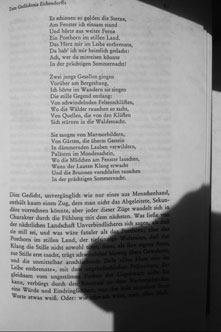Deutsch
»Dies Gedicht, unvergänglich wie nur eines aus Menschenhand, enthält kaum einen Zug, dem man nicht das Abgeleitete, Sekundäre vorrechnen könnte, aber jeder dieser Züge wandelt sich in Charakter durch die Fühlung mit dem nächsten.«
Theodor W. Adorno
Statement
Der Bezug zur unmittelbaren Gegenwart geschieht hier auf eine ganz andere Weise als in den bisherigen Beiträgen. Bei der Vorbereitung bin ich auf eine Bemerkung von Theodor W. Adorno über das Gedicht »Sehnsucht« von Joseph von Eichendorff gestoßen. Adorno sagt: »Dies Gedicht, unvergänglich wie nur eines aus Menschenhand …« – was für ein großes, gewaltiges und extrem wagemutiges Wort! Das hat mich darauf gestoßen, anzuhalten und eins dieser Gedichte von »unvergänglicher Schönheit«, nämlich »Mondnacht«, in die Gruppe der anderen Beiträge hineinzuwerfen. as würde geschehen? Ist es inkommensu-rabel? Nein, das ist es nicht, es kann aber die harte Spannung zum Ausdruck bringen, die zwischen den gegenwärtigen Zeitläuften und einer solchen höchsten künstlerischen Sublimierung von Glückseligkeitsimagination besteht. anz im Sinne dieses fragilen »Diskurses« wollte ich mit einer eher mechanisch-formalen, gewissermaßen metaphorischen Elision einen Hinweis darauf geben, dass diese Imagination augenblicklich ja offensichtlich kaum Chancen hat, eine Kraft im Realen zu entfalten: Das Gedicht entgleitet in meinem Stück der Inanspruchnahme. Man hört nur folgenden Teil:
Es war, als hätt’ der Himmel
Die Erde still geküßt,
Daß sie im Blütenschimmer
Von ihm nun träumen müßt’.
Die Luft ging durch die Felder,
Die Ähren wogten sacht,
Es rauschten leis …
English
»This poem, as immortal as any ever written by the hand of man, contains almost no feature that is not demonstrably derivative, but each of these features is transformed in character through its contact with the others.«
Theodor W. Adorno
Statement
Here I make reference to the present in a very different manner to my previous contributions. During my preparation I came across a comment by Theodor W. Adorno regarding Joseph von Eichendorff’s poem »Sehnsucht« (»desire«). Adorno says: »This poem, as immortal as any every written by the hand of man …«. What a great, tremendous and extremely daring word! This caused me to pause and add one of these poems of »immortal beauty«, namely »Mondnacht« (»Night of the Moon«), to my other contributions. hat would happen? Is this insertion incommensurable? No, it is not, but it may express the strong tension which exists between the present day and a kind of ultimate artistic sublimation of blissful imaginings. ith reference to this fragile »discourse« between reality and the imagined, and using a rather mechanically formal, in a way metaphoric elision, I wanted to show that imagination currently barely has a chance to show its power in the real world: in my piece the poem eludes us. You can only hear the following part:
It was as though the sky
had silently kissed the earth,
so that it now had to dream of sky
in shimmers of flowers.
The air went through the fields,
the corn-ears leaned heavily down
the woods rustled softly —
Quellen / sources:
Theodor W. Adorno, Noten zur Literatur. Zum Gedächtnis Eichendorffs,
Frankfurt am Main 1974, S. 131.
Theodor W. Adorno, Notes to Literature (Vol. 1). In Memory of Eichendorff, New York 1991, S. 71.
